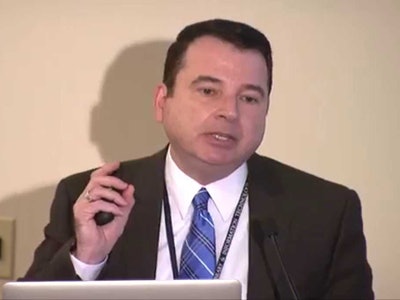ATLANTA — The predictive analytics system that administrators here at George State University implemented five years ago has gotten a lot of positive publicity for how it helped the institution become what one administrator describes as the only public university without an achievement gap.
 Dr. Timothy Renick
Dr. Timothy RenickBut the other part of the story, says Dr. Timothy Renick, vice provost and vice president for enrollment management and student success, was the university’s decision to hire 42 academic advisors to act on the information gleaned from the predictive analytics.
In short, the predictive analytics system at GSU is one that triggers an alert to advisers when students exhibit any one of the 800 risk factors that could derail the student’s academic success. Those risk factors can range from getting a mediocre grade in a prerequisite for one’s major to dropping a course mid-semester.
“What we’ve found is the real challenge is not coming up with the data,” Renick said. “But once you have all these thousands of risk factors identified, do you have a system to take those alerts, put them into action and have mediation so that students can be helped?”
The investment in 42 academic advisors resulted in an additional yearly cost of $2 million, but more than paid for itself because the increased retention rate meant more revenue for the school, Renick said.
“Every one percent we increase our retention rate, that’s $3 million in continuing revenue,” Renick said, explaining that each retained students contributes about $9,800 in tuition.
He said GSU saw an increase of four percentage points in its retention rates within 12 months of using predictive analytics.
“So we more than covered the cost of those advisors,” Renick said.
Renick shared GSU’s success story Monday at a higher education seminar being convened by the Education Writers Association.
The seminar — which ends Tuesday — touches on a variety of topics that range from political speech and racial conflict on campus to undocumented students and race-conscious affirmative action in higher education.
Dr. Walter Kimbrough, president at Dillard University, stressed the need for colleges and universities to develop students who can deal with speakers who espouse views with which they disagree.
Kimbrough drew flak last year when he stood by a decision to let former Ku Klux Klan leader David Duke speak at the university — an HBCU — during a debate of political candidates, even though he had nothing to do with the rules that determined which candidates would participate in the debate.
Still, Kimbrough said he would not shy away from bringing controversial speakers to campus.
“How do we teach students how to debate, understand other ideas that are not their own?” Kimbrough said “It’s something that I model by the people that we bring in.”
Jamaal Abdul-Alim can be reached at [email protected] or you can follow him on Twitter @dcwriter360.



















